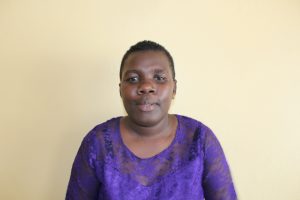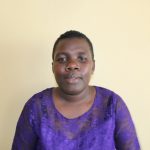January, 2023: Emasera Community School Borehole Well Complete!
We are excited to share that Emasera Community School in Kenya now has access to a new, safe, clean water source thanks to the completion of their new borehole well! Students and staff are already using the well’s flowing water, which will provide them with a reliable source of water for all of their daily needs.
We also installed new latrines and handwashing stations and trained students and staff on improved sanitation and hygiene practices. Together, these components will unlock the opportunity for these students to live better, healthier lives.

Bridgit at the new well.
"I will no longer get thirsty because of lack of water in school. Anytime I feel thirsty, I have access to clean water. I will have enough time to study and do my assignments on time, and [I] am sure my grades will improve," said student Bridgit.
Teachers were just as excited as the students about the new well on campus.

Mr. David Kikuyu.
"As a parent and a community member in this school, [I] am happy my grandchildren will no longer be carrying water to school every day," said farmer and school board chairman Mr. David Kikuyu. "As the board chair of the school, I will no longer hold meetings concerning absenteeism. Now that we have water in school, [I] am sure our pupils will perform well, and they will not miss school anymore."
How We Got the Water Flowing
Parents, staff, and students all played a part in this well’s success. After determining the best site for the well through a hydrogeological survey, we obtained approval and a license from the government to begin drilling.
To prepare, the school collected fine sand and water for cement-making. When everything was ready, and the students went home from class for the weekend (drilling is very loud!), our drill team and staff arrived at the school to begin work.

Drilling commenced with excitement in the air. The team drove down a temporary casing to keep the walls from collapsing as the rig progressed. We continued drilling to reach a final depth of 80 meters with a final static water level of 8 meters.
The drilling process can take up to three consecutive days to complete due to this region’s hard bedrock, so the drill team set up a camp where they could rest and refuel. The school’s kitchen staff and parents helped provide meals for the team, while the school provided a safe place for the artisans’ accommodations and materials.
Once we reached the required depth, the team replaced the temporary casing with a permanent version, then bailed out the dirty water at the bottom of the well. The workers installed pipes, flushed them, tested the well’s yield, and chlorinated the water.

After water treatment, we constructed a cement well pad to seal off the well from any ground-level contaminants. Tiles are installed beneath the spout to protect the cement from the erosive force of the water.
We also included a short drainage channel to carry spilled water away from the pump and prevent standing water. A soak pit absorbs runoff at the end of the drainage channel, further eliminating any stagnant water.

Constructing the well pad.
When the well pad was dry, we installed a new stainless steel AfriDev handpump and sampled the water for a quality test. The results showed this water was safe for drinking!
When the students and teachers arrived back at school, their enthusiasm for this much-anticipated project was overwhelming. We officially handed over the new borehole to the school.

Installing the pump.
Students and staff celebrated the presence of clean water on campus. The event was an excellent chance to acknowledge the school administration and students as the primary parties entrusted with the tools we have given and remind them of our continued support as they develop. Happiness, thanksgiving, and appreciation were the order of the day, flowing in all directions.

VIP Latrines

This project funded the installation of six new ventilated improved pit (VIP) latrines. These new latrines have cement floors designed to be easy to use and clean, locking doors for safety and privacy, and vents to keep air flowing up and out through the roof. With a well right on school property, there should be enough water to keep them clean.
Handwashing Stations

We set up two handwashing stations outside the latrines and handed them over to the newly formed student health club. Health club members will teach other students how to wash their hands at the stations properly, fill the stations with water, and ensure that there is always a cleaning agent available.
New Knowledge
We scheduled hygiene and sanitation training with the school’s staff, who ensured that the training date would be convenient for pupils and teachers. When the training day arrived, facilitators Olivia Bomji and Victor Musemi deployed to the site to lead the event. 20 students and teachers attended the training, which we held under some shady trees in the school courtyard.

Learning about proper dental hygiene.
Our training covered several topics, including personal hygiene, oral hygiene, the ten steps of handwashing, environmental hygiene, child rights, leadership, and operation and maintenance of the well and pump, latrines, and handwashing stations.

Learning how to properly bathe.
Students elected their peers to lead their student health club during the leadership session. Members will encourage good health and hygiene practices amongst their peers, teachers, and the larger community. By the end of the training, each pupil understood their role in sustaining clean water and good health within their school community.
"The most memorable topic was soap making. The participants were so excited to practically learn how to make the liquid soap [that] they asked questions and keenly followed the process. They thought making soap required machines, but they were surprised [about] how easily we made soap. They promised to be making soap for the school and even at home," shared field officer Olivia Bomji.

Students practice making soap.
"The training has made me discover how ignorant I have been concerning hygiene and sanitation. I will do things right from now on, meaning ensuring that whatever [I] am doing is healthy to me and those around me," said 12-year-old Kawa.

Group photo of training participants.
Conclusion
This project required a substantial collaboration between our staff, our in-country teams, and the community members themselves. When an issue arises concerning the well, the students and teachers are equipped with the necessary skills to rectify the problem and ensure the water point works appropriately. However, if the issue is beyond their capabilities, they can contact their local field officers to assist them.
Also, we will continue to offer them unmatchable support as a part of our monitoring and maintenance program. We walk with each community, problem-solving together when they face challenges with functionality, seasonality, or water quality. Together, all these components help us strive for enduring access to reliable, clean, and safe water for this community.
With your contribution, one more piece has been added to a large puzzle of water projects. In our target areas, we’re working toward complete coverage of reliable, maintained water sources within a 30-minute round trip for each community, household, school, and health center. With this in mind, search through our upcoming projects to see which community you can help next!
Thank you for making all of this possible!

November, 2022: Emasera Community Primary School Project Update
When we last sent you an update, the administration at Emasera Community Primary School was trying to gather materials to build the two rain tanks necessary to supply water to the entire school population.
But after running into issues with construction material collection, we were forced to reevaluate whether the rain tanks were really the best solution for Emasera. We sent our staff out to confer with the administration and perform a hydrogeological survey of the school compound. We were ecstatic to find out that, despite the rocky and hilly terrain around the school, the compound does have a viable spot for a borehole well to tap into underground water reserves.
So, after a few hiccups, drilling is finally underway, and Emasera's students will soon be enjoying all the benefits of a safe, reliable water source on their school grounds. We will send you an update once the construction is complete. We can't wait to share the good news with you!
We believe communication is important at The Water Project. That means constant conversation with our teams and supporters, like you. And, if you get a notice like this – it’s actually further proof your gifts are being carefully used towards a water project that lasts.
If you have any questions, give us a call.


 Borehole Well and Hand Pump
Borehole Well and Hand Pump
 Rehabilitation Project
Rehabilitation Project








































